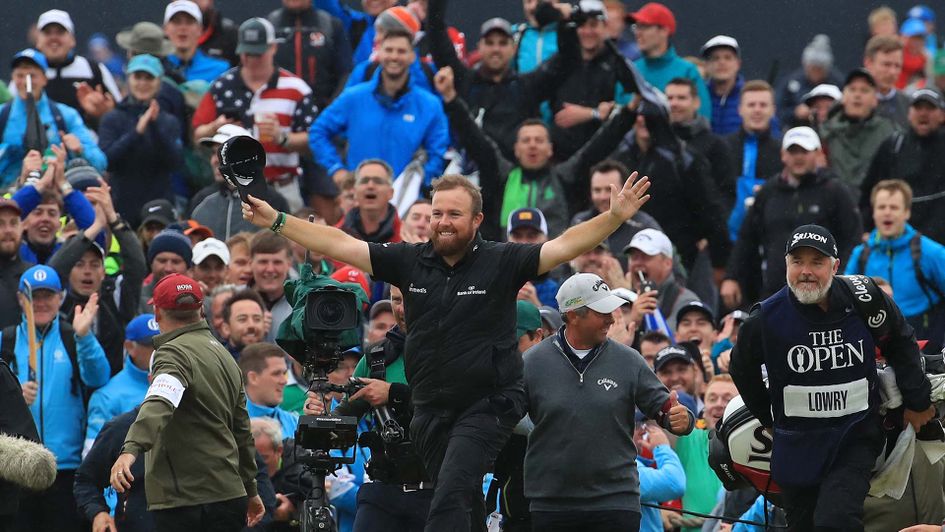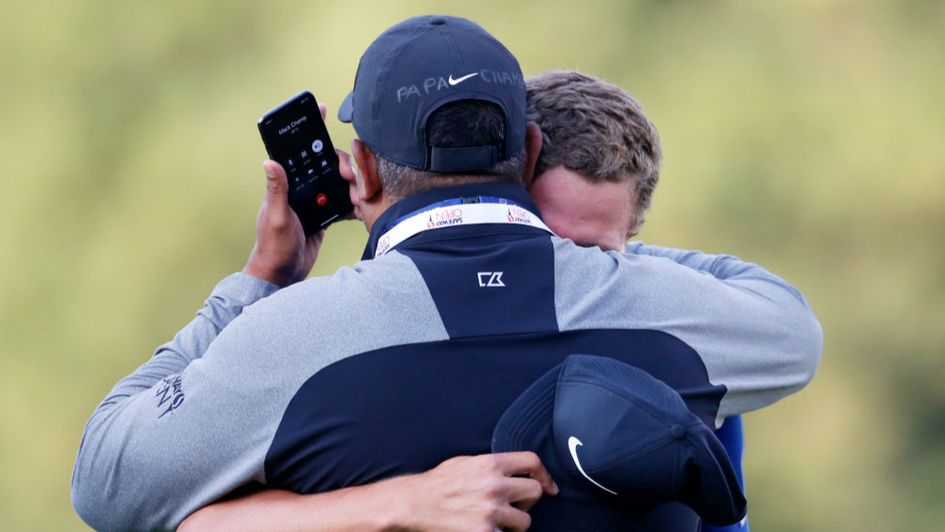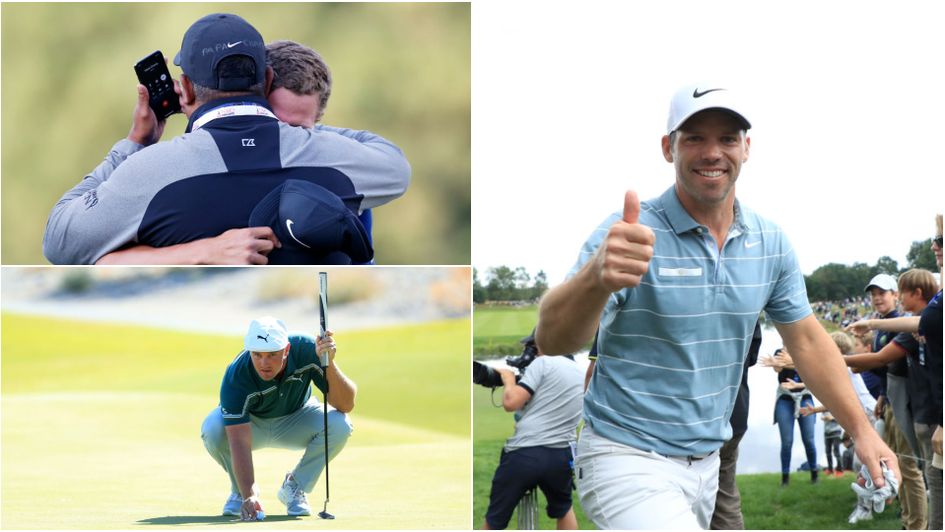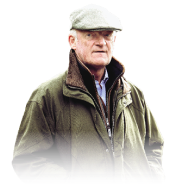In the latest of our 'Golf in 2019' features, Ben Coley picks out a selection of heroes and villains, from Meghan MacLaren and Shane Lowry to Sergio Garcia and the Korean Tour.
Heroes
Paul Casey
"It just didn’t sit well with me. I’ve not talked too much about it and I’m not sure I want to, but certainly signing a deal and being paid to be down there... I would be a hypocrite if I did that."
Paul Casey on why he didn't accept a fat cheque to play golfer and PR man with some of his colleagues in the Saudi International.
Next.
Graeme McDowell
As golfers like Graeme McDowell find the game moving at a pace they struggle to keep with, as age compounds the struggle, it becomes easy to forget what got them here in the first place. We forget, somehow, that as well as his brilliantly accurate driving and a close-range putting ruthlessness to rival anyone, McDowell built his career on being tough and, in many respects, defying expectations.
That's what he did at Pebble Beach in 2010, when Tiger Woods, Phil Mickelson and Ernie Els - three of the five best players of the previous 15 years - were snapping at his heels. It's what he did later that year in the Ryder Cup, where he beat the sweet-swinging Hunter Mahan into submission before being carried in the arms of cheerleaders back to the clubhouse. It's what he's always done.
We shouldn't have been surprised at what McDowell achieved in 2019, but we should be mightily impressed.
Beginning the year of his 40th birthday outside the world's top 200, the Northern Irishman set out to complete a long-held dream - to compete in the Open Championship on home soil, at his beloved Portrush, in the town where he was born and on the course where he learned to play.
There were a couple of routes, none of them straightforward. McDowell could climb back inside the world's top 50, he could go through qualifying, or he could earn a place through one of the Qualifying Series events, a collection of tournaments where a top-10 finish might be enough to snatch one of three available places.
By the time the Canadian Open came around, the world rankings route was closed, and his options were narrowing. So he did what he's always done and did what he had to do, in the most Graeme McDowell way possible.
Standing over a 29-foot par putt on the final green, in an event compatriot Rory McIlroy was in the process of taking apart, McDowell knew he had no choice. It simply had to go in. And so in it went and, as the great man hinted afterwards, el vino did flow.
😴🏌️ Graeme McDowell had been dreaming of playing The Open at Royal Portrush since he was a boy.
— Sporting Life (@SportingLife) June 10, 2019
😰 He's played the course close to 500 times but was running out of time to qualify.
🤞 Until this putt on the 18th...
🙌 @Graeme_McDowell pic.twitter.com/p3PzlYVgTa
"You know, we're on the Golf Canada charter over to Pebble," McDowell said. "Maybe a couple brewskis on there perhaps. Typically the RBC charters the Sunday night of the Open Championship on the way to the Canadian and there is more than a few brewskis had that night."
Yeah, he drinks.
Meghan MacLaren
In 2019, Meghan MacLaren took over from Eddie Pepperell at the top of the golf blogging tree. She doesn't just write; she writes beautifully. And she doesn't just talk about her life on tour. She probes and protests and asks the questions which need asking.
Read her blog (a word that does it no justice) and you'll lose count of turns of phrase you wish you'd come up with. Her pay-offs are brilliant. Her opening paragraphs are sometimes even better. I'd recommend you take a look at all of the words MacLaren has connected this year, but if you want a favourite, it's actually her piece about Ben Stokes and his heroics for England during the summer.
It begins brilliantly: "I’m about to do something that feels a little wrong. Like my putting over the past week, it’s as though someone else has control of my hands. I’m going to write about cricket." And it ends brilliantly: "Sport loves stories, but it doesn’t wait for them. Except when it does. And it’s f***ing beautiful."
Read the bits inbetween, and much more, right here.
Shane Lowry
Not, would you believe, for providing light in a dark tipping year. There's more to life, and doesn't he know it - Shane Lowry is in here for his astonishing Open romp and the riotous celebrations which followed.
From the week he burst onto the scene with victory in the Irish Open as an amateur, Lowry has been the everyman golfer. It's not just about his physique, either: it's about his stride, his attitude, how normal he seems. Born and raised in Ireland, this is not a man who is going to forget where he came from, and victory at Portrush represented a homecoming in every sense.
🎤 Fair to share Shane Lowry will definitely be enjoying his win at #TheOpen
— Sporting Life (@SportingLife) July 22, 2019
🏆 Love the way he's still got the trophy....pic.twitter.com/sANy8e5Mbn
A couple of years earlier, Lowry - who blew a fine chance to win the US Open in 2016 - based himself in America. He didn't like it, and his game suffered as a result. Languishing outside the world's top 100, this former World Golf Championship winner needed to go back to what got him that far and, with his family for support, that's exactly what he did.
I'll be writing more about Portrush and that drunken weekend over the coming weeks, but for now Lowry earns his place here as much for the boozy tour of Ireland he embarked upon, as the performance he produced to earn that Claret Jug.
In years to come, when people need an example of a true 'People's Champion', they'll say Shane Lowry.

Suzann Pettersen
If you're of a certain age, by which I mean if you qualify for an 18-30s holiday, which I assume must still be a thing, chances are you've replied to a tweet you like with that gif of Obama dropping his microphone intentionally, a.k.a micdrop.gif.
In a fair world, the gif would be of Suzann Pettersen, dropping her putter on the final green of the final match having somehow won the Solheim Cup for Europe, after which she actually retired from the sport in the coolest thing I have ever seen on a golf course.
Pettersen didn't just stand tallest in the most pressurised environment golf has; she did so having been handed a controversial wildcard, after taking time out to give birth to a baby human, and four years on from a downright unpleasant concession episode which threatened to be the defining moment of a brilliant career. To do all that and then walk away? I'm not sure it gets any better.
The very best definitions of the word hero surely begin with labour (note for those who somehow think I chair Momentum in my spare time: lowercase l) and end on a golf course. Pettersen is the undoubted hero of the year. I just wanted to start with PC.
(Also, Matt Cooper's piece on the Solheim Cup and its remarkable conclusion will be published in a fortnight. Make sure you come back for it.)
🇪🇺 SOLHEIM CUP MAGIC 🇪🇺
— Ladies European Tour (@LETgolf) December 1, 2019
Votes open for @BBCSport @bbcspoty Greatest Sporting Moment of the Year!
There are six contenders on the shortlist including @suzannpettersen @SolheimCupEuro winning putt 🏆
Help put golf on the map. RT & VOTE now: https://t.co/2tgzNXamAu#SPOTY pic.twitter.com/gaJJipvkVL
Champ, Walters, Lashley and Harrington
It does all four of the above - Cameron, Justin, Nate, and Scott - a disservice to group them together, but there is a theme which connects these four golfers: success in the face of adversity. They merit so much more than passing mention, but here goes anyway.
Champ, the monstrously long hitter who made an immediate and significant impression a year ago, won his second PGA Tour title at the Safeway Open. He did so as his grandfather, Mack, lay in bed, soon to be taken by cancer. It was a herculean effort from a golfer of enormous talent, one whose grounding comes from 'Pops', his grandfather, the man he calls his hero. The picture below speaks for itself.

Walters' achievement in finishing second in Portugal, keeping his European Tour card in the process, was no less impressive. It came at the end of a summer which saw him lose his father and, just as he did shortly after the death of his mother in 2013, Walters found a sense of perspective on the golf course which helped him to conjure one of the performances of his career. The South African is extremely popular for a reason and ought to be incredibly proud of what he did.
As should Lashley. His story goes back further, to college, when his parents and his girlfriend died in a plane crash on their way to support him in an NCAA regional event. I'm not sure what else there is to say, except that perhaps it's no wonder it took Lashley until the age of 36 to fulfil his long-held potential and win on the PGA Tour. He did so in style, winning by six in the first edition of the Rocket Mortgage Classic.
And then there's Harrington, who earned his PGA Tour card with the shot of his life. Harrington's career had looked doomed to fail, his game in disarray as he focused on his wife, who was extremely ill. He helped her to recover, and she helped him to rebuild, a process which came to its natural end on the final hole of the WinCo Foods Portland Open, played in his hometown.
There he stood, middle of the fairway, needing a four to guarantee promotion to the PGA Tour. Harrington hit a six-iron to 10-feet, and two-putted for birdie. Sixteen years it had taken, and finally he was where he'd always wanted to be, on the PGA Tour, his wife by his side.
These are the stories which resonate beyond the majors and money lists. They carry a human power, and a reminder that behind the swing and the sponsors is a person, who breathes the same air and faces much of the same challenges. Whatever Ian Poulter might think, golfers are not billionaires. A lot of them struggle to make ends meet. Harrington, the very definition of a journeyman, teaches us all to dream big.
Honourable mentions
Jon Rahm, for being brilliant and also finding time to help Ryan Palmer to win again. Chris Hanson for beginning a new adventure with the 2020 Pro Tour. Rhys Enoch, who could easily have featured in the segment immediately above. PA journalist Phil Casey, for lending me some clothes, and Metro journalist Nick Metcalfe for the song in his heart. Gary Woodland for being both brilliantly talented - so much so he became a major champion - and for being so obviously, naturally human, as we saw in Phoenix. Eddie Pepperell for actually coming on our podcast. Tiger Woods for a remarkable act of self-resurrection, which will be covered in the final article of this series, just before Christmas. Charlie Hull for being really cool. Nick Dougherty for becoming a genuinely first-class presenter in no time. Another podcast guest, Chris Lloyd, for his work in Kenya. Tommy Fleetwood, Christiaan Bezuidenhout, Kevin Na.
Villains
Sergio Garcia
Can I shock you? I like Sergio Garcia. At various points in my life I've actually felt like I might love him. And not love him like you just love the John Lewis Christmas advert or the idea of adopting a dog. Actual love. Real love. The sort of love that makes you laugh and cry and pace up and down the office as he somehow forces a play-off in The Masters. And then more crying when he only wins the bloody thing.
This year, the wearied rascal tested that affection. I can cope with on-course tantrums, especially from a man so obviously lacking sleep. I feel like I understand that particular line of frustration. Clearly, as those loyal twitter followers will know, we all have to have a place to go to when we need to let off some steam. Catharsis is important. It just shouldn't happen on the green in tournament play, where each and every blow can affect the performance, and even the livelihood, of those in behind.
In Saudi Arabia, Garcia instead decided to take out his frustrations on the golf course, first a bunker and then, away from the TV cameras (well...), on the greens. Such was the damage - and the outrage among professionals, some of whom evidently draw their lines in the bit of sand between dismemberment of journalists and dismemberment of greens - that Garcia was disqualified. In a form of recompense, next year he will play the Saudi International without receiving an appearance fee, which is like selling your soul to the devil for about three pounds fifty.
Then again, maybe Garcia was, in that moment, all of us. Maybe the greens were the Saudi regime, and he was our outrage. Our frenzied, righteous outrage. Yes, that must have been it. It must be love.
Phil Mickelson
I promise, this section will not be restricted to opining about Saudi Arabia. Honestly. I don't even feel as strongly about it as you might think I do; when a golfer explained to me why he played in the event, without receiving an appearance fee, I couldn't help but sympathise. Most of us aren't faced with the question we think is so easy to answer.
With that out of the way, Phil Mickelson's decision to play in next year's Saudi International, and then to take to twitter to childishly dismiss his critics, is hugely disappointing. Phil has always been more complex than the lumbering, thumbs-upping, 'hey, it's Uncle Phil!' we're presented with, and no amount of autograph signing and he-tips-well propagandising should change that. Just Google his name with some random letters like, oh, F, B and, I don't know, I? Yeah, try that. If Sergio is a scamp, Phil might just be a scoundrel.
Still, I thought - as so many do - that he was basically one of the good guys. Perhaps he still is. But choosing to take the money and flash a smile, to lie about the potential for growth and the chance to see a new country, to dismiss criticism in the way that he has, well, it challenges that assumption. Mickelson is rich. He does not need to go to Saudi Arabia and take part in a sham PR mission. He doesn't need to chase ranking points, he shouldn't need to pursue the biggest purse, he owes the European Tour nothing, and I can think of no good reason to be there bar greed.
If his sole motivator here is to experience a new country and help take part in a revolution, I recommend the Kenya Open. Nairobi is a fantastic city, and there are some gorgeous golf courses dotted around it. There is a real passion for golf, complete with a professional circuit and an abundance of raw talent waiting to be realised. There's fantastic charity work from Glad's House. There's the opportunity to see the Great Rift Valley, to watch the mist rise from the top of Thompson's Falls, to drive around Lake Naivasha, to play a par-three course on the side of Mount Kenya, and to experience a culture almost the exact opposite to the one he lives in.
Of course, the Kenyan government haven't offered Phil a seven-figure sum, and suddenly his desire to have his eyes opened to the big wide world is diminished. If you want to go and take the money of a regime which butchered a fellow US citizen, you go and do that. Just spare us the b*llsh*t.
After turning down opportunities to go to the Middle East for many years, I’m excited to go play and see a place in the world I’ve never been. I understand those who are upset or disappointed. You’ll be ok. I’m excited to experience this for the first time.
— Phil Mickelson (@PhilMickelson) December 3, 2019
Hank Haney
When Hank Haney predicted that the winner of the Women's US Open would be "a Korean", extending the thought to "I'd go with Lee," he was being a little bit racist, and quite a lot horrible. And his subsequent (non-) apology only made worse his puerile attempt at humour, the kind which is most likely to come from a mid-sixties white man with delusions of grandeur, the sort who believes in patriarchy and is not used to having that view challenged.
Ahead of the second major of the women's season, Haney found himself in an on-air conversation about the event. Instead of admitting that he doesn't know enough about the players to make an informed prediction, he chose to speak in a way which says more about him than the section of the sport he was treading on.
"This week is the US Women's Open, Hank," host Steve Johnson said.
"Oh, it is? I'm gonna predict a Korean," replied Haney. "I couldn't name you six players on the LPGA Tour. Maybe I could. Well... I'd go with Lee. If I didn't have to name a first name, I'd get a bunch of 'em right.
"Where are they playing, by the way?"
Hubristic Haney later claimed that victory for Jeongeun Lee6 validated his troping nonsense, which he went on to insist was based on 'statistics'. Lee6, after all, is Korean, just like Jin-young Ko, who had taken the ANA Inspiration earlier in the season.
Let's deal in actual facts: Jeongeun Lee6 was the first player with the surname Lee to win a women's major. Thailand, Korea, Japan, China and Taiwan are not the same. Korea is a hugely successful golfing nation, especially in the women's game, but it is not overwhelmingly dominant. Not yet, anyway.
In the men's game, 60 per cent of majors played so far have been won by an American, each of them without the sort of creeping sexism and borderline racism which coloured Haney's remarks. Over the last decade, South Korean golfers have won nine of the women's majors. Americans have won eight. You'll be fine, Hank. You really will.
Next year, Haney might try to stress that, as a nation, Korea remains at the top of the tree - without revealing so much about himself in the process. That or producers might form an agreement to seek out a proper expert in what's on the agenda, rather than someone with a hard-on for his own ignorance.
A comeback king, a plea 'fore' safety and Hank Haney doubles down in a dubious way.
— Golf Central (@GolfCentral) June 7, 2019
Read this week's Cut Line by @RexHoggardGC: https://t.co/acPzHFQtuU pic.twitter.com/G3gbeCplVr
Bryson DeChambeau
If there's a theme to the villainous list, it's that if you're going to do something so easily criticised, be ready for criticism. Bryson DeChambeau, who on several occasions this year has been caught playing at a pace which should not be considered acceptable, has responded with an indignation which confirms that he really does not get it. He is not the victim here, and it's foolish to offer up a defence which basically amounts to 'but I'm not the slowest!'
What you are, Bryson, is consistently too slow. And the two-minute-plus putt at The Northern Trust was among the sorriest episodes on golf television in 2019. I don't care how much that putt (which you missed, obviously) might have been worth. You might not think it your responsibility to help promote, dare I say grow, this game (which you demonstrated with a fine stint in Saudi), but it is at the very least your responsibility not to drive charming young men like Justin Thomas to the brink of early retirement.
"This is a really difficult watch," said Sky Sports' Andrew Coltart, as DeChambeau wasted two minutes of his life and ours, at one stage appearing as though he might just pack it all in. If only. "His lack of awareness, his lack of respect for his playing partners... I'm struggling to understand how he feels it's OK for him to take four times longer than anybody else.
Quite.
😡 "I'm going to take a little bit longer because that's my job. I'm supposed to be providing entertainment for you guys."
— Sporting Life (@SportingLife) August 12, 2019
Bryson DeChambeau hits back at critics saying his slow play is killing golf and also blames caddies for not walking fast enough!pic.twitter.com/jkAZCe97i0
Dishonourable mentions
J.B. Holmes, for slowly winning the Genesis Open one week after an appalling display at Pebble Beach. I don't forget things like that. Kyle Stanley for daring to hit the ball at Our Bob MacIntyre's family, not shout fore, and have the chutzpah to go on the offensive afterwards. Korean Tour officials for imposing a ban on Bio Kim more in keeping with methods north of the border. Matt Wallace for becoming golfing public enemy number one after laying into his (ex-) caddie in Germany, not for the first time. Slugger White for doing absolutely nothing about slow play and trying to sell inaction as sympathy towards The Struggle. Keith Pelley for not doing the brave thing, the right thing, and for carrying on regardless. Christina Kim for dealing with an awkward situation badly. Anthony Kim for not putting us all out of our misery. Matt Kuchar, again. Donald Trump and playing partners. Prince Andrew, who you can read about in a piece by Michael McEwan.









